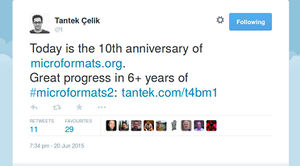favorite
This article is a stub. You can help the IndieWeb wiki by expanding it.
🌟 A favorite is a common webaction on many silos (like Flickr, Twitter), typically visually indicated with a star symbol that fills in with a color when activated (pink, orange). A favorite is similar to but somewhat different from a like.
Why
If you "favorite" things on silos (e.g. Twitter, Flickr), it may make sense to support the same literal type "favorite" (or at least microcopy) on your own site in order to replace that silo usage with using your own website instead.
Alternatively, if you treat a favorite on such silos posts as a "like" (as in, when you favorite a tweet, you mean you like it), then you should support like posts instead.
How
Very often favorites and likes appear to be treated as the same thing, thus re-use "u-like-of" markup as documented in like#How.
IndieWeb Examples
There are no known examples of indieweb favorite posts. See like#IndieWeb_Examples for similar examples.
Similarity to Like
Favorites are similar to likes in how they're represented in some systems.
Similarities:
- number of (favorites/likes) shown on posts (Facebook, Flickr, Instagram, Twitter)
- shows up in a feed of your activities viewable by your friends/followers (Facebook, Twitter)
- ...
Differences From Like
There's some anecdotal evidence that users consider "likes" different from "favorites".
Also they seem to behave differently across systems:
Likes:
- icons: thumbs-up (Facebook), heart (Instagram)
- means: props/compliments to the original post/poster
- presumed lightweight
- activating increments a count (nearly) immediately (Facebook, Instagram)
- only one instance of browsable likes as a set (Instagram, and those only by the liker).
Favorites:
- icon: star, changes when activated (fills in with a color: pink (Flickr), orange (Twitter))
- means: special to the favoriter
- implies adding to a collection - favorites are always browsable (typically publicly) as a set (e.g. your Flickr Favorites, Twitter Favorites)
- curating
- many more nuances discussed by Jessica Roy flirt, hate, i'm watching you, ending a conversation
These differences may be subtle enough as to make it confusing if both were present in a system - there are no known systems that have both.
Silo Examples
Flickr
Flickr puts a star favorite button on a photo, clicking it puts that photo into your "Favorites" collection/album, and adds to the favorite count (and list of favoriters) of that photo.
Flickr may have been the first "social silo" to introduce the favorite button and feature, and use a star icon (pink in this case) to do so, in 2004 (first year of Flickr's launch).
Favoriting UI:
- Twitter puts a star favorite button (⭐ Favorite) under each tweet that adds it to your Favorites collection and fills in the star. Clicking/tapping it again removes it from your Favorites collection and empties the star.
Viewing favorites:
- View any public Twitter profile's favorites by appending "/favorites" to their Twitter profile URL, e.g.:
- On a Tweet the favorites are shown as a facepile with only some (oldest/newest?) displayed and others hidden (screenshot taken 2015-06-25)
- A full list is shown in a modal dialog (screenshot taken 2015-06-25)
History:
- on Twitter Blog: Six More Twitter Updates!
Favorites! When you come across a Twitter update that you really like you can save it by clicking the little star. We collect your favorites for you so you can get back to them any time.
See Twitter#Early_User_Interface for a UI screenshot *before* Favorites were introduced, and then several variants of Favorites UI afterwards.
Clustering favorites:
- In the "notifications" tab, Twitter generates a single story when multiple people favorite one of your tweets. (screenshot taken 2015-01-23)
Perceived meaning and usage: Favorite is used to many different ways on twitter, espceially as it now notifies the person whose tweet was favorited. See Rebecca Greenfield and Jessica Roy for discusssions of this.
FAQ
Do both or not
Q: Should I have both favorite and like posts?
A: Why?
Do you want to use both favorite and like? if so, how do they differ to you?
If not, just pick one and use that. The difference has been discussed quite a bit here, and trivial differences documented above: Differences from like.



